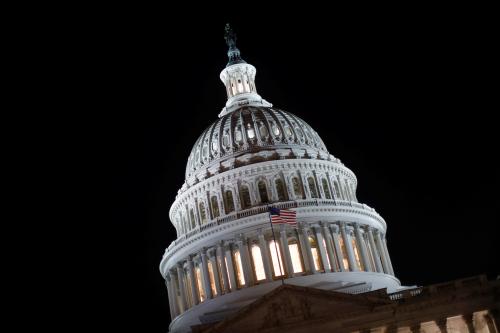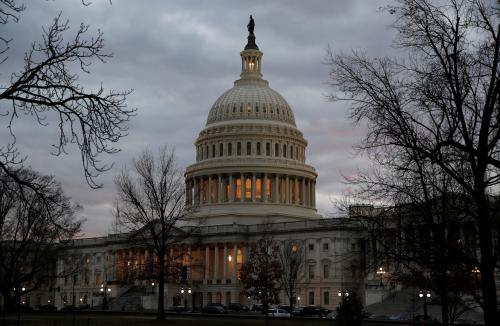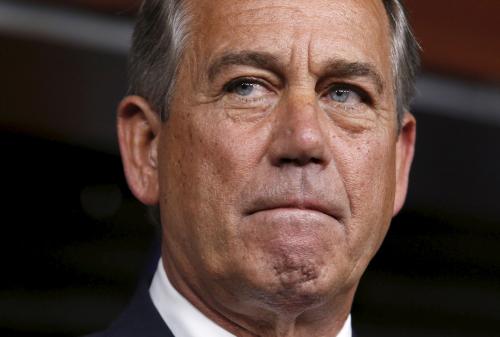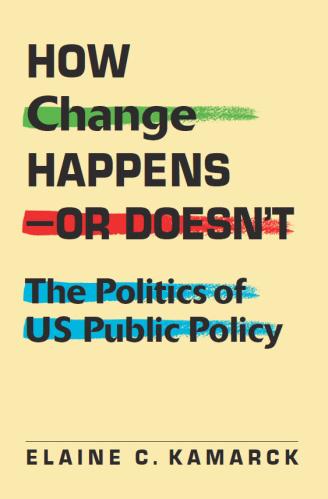The end of the shutdown may be one of those inflection points in history. The Senate Majority Leader put his integrity on the line by promising a debate on the fate of DREAMers with a fair amendment process. Twenty-five members of the United States Senate began acting like competent legislators again as they engineered the end to the government shutdown—brought about primarily as a result of the president’s inability to lead.
This begs a question: Are we entering a period in history, not unlike the period between the Civil War and the Great Depression, when presidents were relatively weak and Congress ran the show?
Even before the government shutdown, my colleague Walter Shapiro wrote about an 1885 book by a young political scientist who eventually became president of the United States, Woodrow Wilson.
In Congressional Government, Wilson describes the declining importance and power of the president in the years since Abraham Lincoln. Congress, according to Wilson, was “the central and predominant power of the system.” Those immediate post-war years saw a succession of weak and troubled presidencies; from Andrew Johnson who so outraged his party that they impeached him, to Ulysses S. Grant who presided over an orgy of governmental corruption, to James Garfield who was assassinated shortly after his inauguration, to Chester Arthur who managed one pretty uneventful term. As the nineteenth century turned to the twentieth, presidents seemed to get more powerful and Wilson revised his opinions somewhat. When he became president himself, Wilson attempted to be a powerful and transformative actor on the world stage—only to see his hard work fail in Congress.
But all of that changed in the decades after President Wilson with the election of Franklin Delano Roosevelt. When Roosevelt was elected in 1932 no president since Lincoln had so dominated government. Roosevelt led a battered country through sixteen years of depression and war, and through it created the modern presidency. Every president since then has tried to emulate the sheer power he (Roosevelt) held over the government. We count successes in the first 100 days in office because of Roosevelt’s astonishing series of orders and legislation, we count the ability to sway the nation because of Roosevelt’s use of radio, and we count leadership on a global stage because of Roosevelt’s leadership in the Second World War.
So now we come to President Trump, the third president of the 21st century—a man with no prior governmental experience and either no will or ability (we’ll let history sort that one out) to learn. As he began his second year in office, his limits as a leader were clearly on display. In the weeks leading up to the shutdown, a major issue was the status of the “DREAMers”—young people who were brought to the United States with their parents illegally as young children, grew up here and now find themselves in legal limbo.
Trump’s handling of that issue sowed confusion and distrust. In September, he said: “I have a love for these people and hopefully, now Congress will be able to help them and do it properly.” Then in December: “We’re going to work something out that’s going to make people happy and proud.” He went on to note, “[t]hey got brought here at a very young age, they’ve worked here, they’ve gone to school here. Some were good students. Some have wonderful jobs. And they’re in never-never land because they don’t know what’s going to happen.” In January, Trump held a 55-minute televised discussion with congressional leaders, designed to show, in the wake of a book that criticized his capacity to be president, that he was capable of discussing a policy and negotiating. The session began with Senator Dianne Feinstein (D-Calif.) asking the president if he would support a “clean” bill—meaning a bill to deal with the impending deadline without other items or “poison pills” attached to it. The President agreed…for less than a minute. Then, House Majority Leader Kevin McCarthy (R- Calif.) interrupted to “remind” the president that any bill on DACA would have to have assurances in it for border security and other items. For the millions of Americans who saw that clip over and over again, the message was clear: President Trump was not in charge.
That was only the beginning of what became a confusing period of time during which Democrats and some Republicans who supported the a permanent, legislative fix for DACA tried to pin down the president as the clock ticked down towards a government showdown. The president summoned Senate Minority Leader Chuck Schumer (D-N.Y.) to the White House the day before the shutdown—only to have the deal fall apart. As the weekend wore on Senator Lindsey Graham (R-S.C.) exploded at the White House staff, telling reporters “Every time we have a proposal it is only yanked back by staff members. As long as Stephen Miller is in charge of negotiating immigration, we’re going nowhere.”
By the time the government had shut down, Trump’s political aides posted an online ad which said: “Democrats who stand in our way will be complicit in every murder committed by illegal immigrants. President Trump will fix our border and keep our families safe.”
So much for love.
It is now clear that negotiating with this president is, as Senator Schumer put it, “like negotiating with jello.” Most Republican senators would not go so far as to insult the president publicly, but they, too, learned the lesson. CNN ran a headline calling the president “irrelevant.” In his first year, Trump has failed to negotiate anything successfully, with the sole exception of the tax bill. Other than that, his cupboard is bare.
Power, like nature, abhors a vacuum. But the Constitution has an answer for that. Congress is a co-equal branch of government. In the modern era, we are accustomed to waiting for presidential leadership, but that need not be the case. Time and again President Trump has told members of Congress to “work it out” and bring him a bill. But don’t blame the current congressional leadership for their reluctance to step out. They, like the rest of America, have come of age in the era of presidents who were, in Wilson’s words, “the central and predominant power of the system.” The newfound bonhomie on the floor of the Senate could be the start of something old that has sprung anew—congressional government.










Commentary
“President Chaos” and a return to Congressional government
January 23, 2018